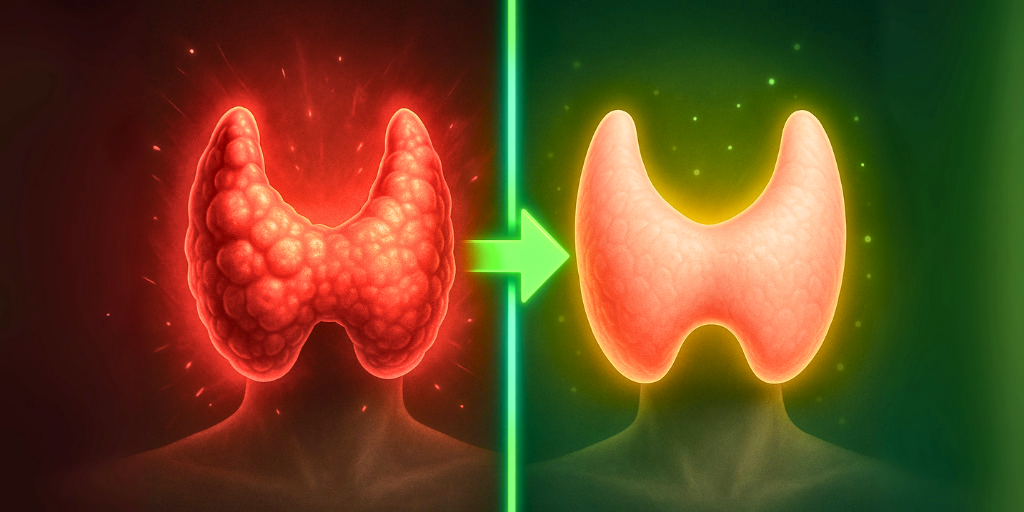
Thyroid issues are surprisingly common and can really mess with your metabolism, leading to weight gain and higher blood sugar. Often, these problems, including thyroid nodules, stem from inflammation and a lack of essential minerals like iodine and selenium. When these nutrients are low, your thyroid can enlarge, and nodules can form. If not addressed, this can lead to thyroid dysfunction or, in more serious cases, cancer. This post explores the critical role of selenium and iodine in thyroid health and outlines key steps to help restore your thyroid function. (Based on the expertise of Dr. Antonio Cota.)
Key Takeaways
- Selenium is Vital: This mineral is crucial for your thyroid to function correctly and can even help reverse thyroid problems, including nodules.
- Iodine is Essential: Along with selenium, iodine is a building block for thyroid hormones. A deficiency can lead to an enlarged thyroid (goiter).
- Inflammation is a Major Factor: Many thyroid issues are linked to inflammation, which selenium can help reduce.
- Holistic Approach Needed: While selenium and iodine are key, they work best alongside other health improvements like a balanced diet, managing insulin resistance, and reducing cortisol.
- Early Intervention is Best: Addressing thyroid concerns early, even when they are just signs of inflammation or subclinical hypothyroidism, can prevent more serious issues.
Understanding Thyroid Function
The thyroid gland, though small, controls many vital bodily functions, including temperature, energy levels, sleep, digestion, heart rate, and even glucose levels. When it doesn’t work right, it can lead to either an overactive thyroid (hyperthyroidism) or an underactive thyroid (hypothyroidism). This discussion focuses on hypothyroidism and thyroid nodules.
For the thyroid to work properly, several things need to happen:
- Hormone Synthesis: The thyroid must produce thyroid hormones correctly.
- Hormone Transport: Once made, these hormones need to be released into the bloodstream and travel to where they’re needed.
- Hormone Metabolism: The body must be able to use these hormones effectively.
- Regulation: There needs to be a system to ensure the thyroid doesn’t produce too much or too little hormone.
- Target Organ Health: The parts of the body that receive the thyroid hormones must be healthy enough to respond.
The Role of Selenium and Iodine
Thyroid hormones are made using building blocks like proteins and amino acids, but two minerals are particularly important: iodine and selenium.
Iodine: This mineral is essential for the synthesis of thyroid hormones. Without enough iodine, the thyroid gland can’t produce these hormones properly, often leading to an enlarged thyroid, a condition known as goiter. While iodine deficiency is less common today due to iodized salt and fortified foods, it’s still a possibility.
Selenium: This mineral plays a critical role in the metabolism of thyroid hormones, meaning it helps your body actually use the hormones it produces. Even if your thyroid hormone levels look normal on a blood test, your body might not be using them effectively if selenium levels are low. Selenium also has anti-inflammatory properties, which is significant because inflammation is often at the root of thyroid problems, including autoimmune conditions like Hashimoto’s or Graves’ disease. In some cases, selenium supplementation has been shown to reduce the antibodies that attack the thyroid in these conditions.
Natural Sources and Supplementation
Sources of Iodine:
- Seafood (fish, shrimp, etc.)
- Eggs
- Dairy products (yogurt, cheese, milk)
- Iodized salt
Sources of Selenium:
- Garlic (a very potent source)
- Organ meats (like liver)
- Seafood
- Eggs
- Dairy products
When it comes to supplements, 200 micrograms of selenium per day is often recommended for a period of 2-3 months. For iodine, the dosage is typically 300-400 micrograms daily. It’s important to note that while iodine deficiency is rare, supplementing for a short period won’t hurt. Always be cautious with iodine supplements and ensure you are not using topical antiseptics by mistake.
Addressing Thyroid Nodules and Inflammation
Thyroid nodules are often a result of inflammation. A compelling case study involved a woman with thyroid nodules who, after incorporating more garlic (a rich source of selenium) into her diet, saw her nodules disappear. This highlights how increasing selenium intake can help reduce inflammation and potentially resolve nodules.
Selenium is particularly helpful in combating inflammation and reducing thyroid antibodies. For many people, 200 micrograms of selenium daily can significantly lower inflammation.
Key Steps to Restore Thyroid Function
To truly restore thyroid function, a multi-faceted approach is necessary:
- Ensure Proper Synthesis: Make sure you have the necessary building blocks, including iodine. If there’s a significant deficiency and symptoms of hypothyroidism, starting with thyroid hormone medication might be considered.
- Optimize Hormone Metabolism: This is where selenium comes in. Taking 200 mcg daily helps ensure your body can effectively use thyroid hormones.
- Combat Inflammation: Selenium also plays a role here by reducing inflammation and antibodies. If you have elevated thyroid antibodies but your thyroid is still functioning well, it’s a critical time to address the inflammation before it damages the gland.
Monitoring Your Thyroid Health
Regular monitoring is key. This includes:
- Thyroid Profile Blood Tests: To check hormone levels.
- Inflammation Markers: Such as C-reactive protein or ferritin.
- Thyroid Antibodies: Specifically anti-TPO antibodies if hypothyroidism is suspected.
- Ultrasound: To visualize the thyroid gland, check for nodules, and assess its overall condition. An ultrasound is a quick, non-invasive way to get a clearer picture of your thyroid health.
When to Act
It’s often better to address thyroid issues early. If your blood tests show signs of inflammation or subclinical hypothyroidism (where the thyroid is starting to show problems but still functions adequately), it’s the ideal time to intervene. Waiting until the thyroid is severely damaged or atrophied can make recovery much more difficult. By taking proactive steps, you can work towards restoring your thyroid’s function and potentially avoid long-term reliance on medication.
Source: Dr. Antonio Cota

